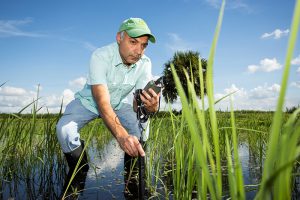- Two University of Florida scientists have joined a national research effort to promote phosphorus sustainability across the United States. Together they will work under the funding auspices of the National Science Foundation-Science and Technology Center (NSF-STC) in the newly established Science and Technologies for Phosphorus Sustainability (STEPS) Center.
- The research will tackle one of the world’s growing and somewhat hidden problems — that of a sustainable phosphorus supply for the food system and being mindful of its impacts on soils, waters, and the environment.
- With STEPS come several goals. One of the more ambitious objectives aims to facilitate a 25% reduction in human dependence on mined phosphates and a 25% reduction in phosphorus losses to soils and water resources within 25 years.
FLORIDA –Two University of Florida scientists have joined a national research effort to promote phosphorus sustainability across the United States.
Together they will work under the funding auspices of the National Science Foundation-Science and Technology Center (NSF-STC) in the newly established Science and Technologies for Phosphorus Sustainability (STEPS) Center.

Jehangir Bhadha, an assistant professor of soil and water sciences at the UF Institute of Food and Agricultural Sciences Everglades Research and Education Center (UF/IFAS EREC), and Sandra Guzmán, an agricultural engineer and assistant professor at the UF/IFAS Indian River Research and Education Center (UF/IFAS IRREC) have joined the STEPS center with eight other universities.
Led by North Carolina State University, STEPS will be headquartered on N.C. State’s Centennial Campus and is funded by an initial, five-year, $25 million grant that is renewable for an additional five years. Through this project, scientists will work to reduce dependence on mined phosphates and the amount of phosphorus that leaches into soil and water.

“Phosphorus is vital for human existence, yet not a renewable resource,” Bhadha said. “So, it is imperative for us to use it efficiently. As the world’s population increases, and acres of farmlands shrink, we need to get innovative in finding ways to feed more mouths with limited resources.”
Phosphorus is a key nutrient in all forms of life. As a vital component in DNA and all living organisms, phosphorus is also tied to food security because it is essential for food production as one of three nutrients — along with potassium and nitrogen — used in commercial fertilizer.
The problem lies in its supply: It cannot be replaced, there is no synthetic substitute and it is a geographically restricted resource. The industry relies on mined, non-renewable phosphates that could soon be depleted – as well as system inefficiencies and downstream effects on the environment.
“STEPS will give us the opportunity to explore and discover ‘out-of-the-box’ solutions for phosphorous uptake, capture and overall management,” said Guzmán. “Phosphorous management is a complex social challenge as it can generate high benefits for food security but also high impacts in the short and long term.”
STEPS is a convergence research center with phosphorus sustainability as the vehicle, added Bhadha.
“The research will tackle one of the world’s growing and somewhat hidden problems — that of a sustainable phosphorus supply for the food system and being mindful of its impacts on soil, water, and the environment. Getting the balance right between phosphorus sufficiency and efficiency will be key,” he said.
With STEPS come several goals. One of the more ambitious objectives aims to facilitate a 25% reduction in human dependence on mined phosphates and a 25% reduction in phosphorus losses to soil and water resources within 25 years. Researchers hope to enhance resilience of food systems and reduced environmental damage.
STEPS goals will also leverage disciplinary contributions like team science and data science, while drawing on the expertise of industry partners to help guide the center’s work. These partners include stakeholders in agribusiness, municipal water and wastewater treatment, agriculture Extension services and others.
There is also a strong inclusivity aspect. STEPS will foster progress toward a goal of more than 50% participation by members of underrepresented groups, including more than 50% pre-baccalaureate participation to further broaden and develop the STEM pipeline. To ensure this goal is met, STEPS will use proven approaches to make sure that all participants, especially those from groups underrepresented in science and technology – including women, minorities and people with disabilities – have experiences in STEPS that lead to their retention and career progression.
STEPS will engage the public in various ways, offering a new series of continuing education courses and a continuing education certificate.
“Phosphorus sustainability is not a trivial challenge, as a matter of fact, it is a very complex issue that needs immediate attention and cooperation from numerous parties and our communities,” said Bhadha. “This is not an effort limited to scientists, regulators and growers. All of humanity needs to play their part in addressing the challenges of phosphorus sustainability if we are to protect our environment and promote food security for future generations.”
STEPS partner institutions include Arizona State University, Appalachian State University, the Joint School of Nanoscience and Engineering at North Carolina Agricultural and Technical State University, University of North Carolina Greensboro, Marquette University, RTI International, and the University of Illinois.
-30-
By: Lourdes Mederos
The mission of the University of Florida Institute of Food and Agricultural Sciences (UF/IFAS) is to develop knowledge relevant to agricultural, human and natural resources and to make that knowledge available to sustain and enhance the quality of human life. With more than a dozen research facilities, 67 county Extension offices, and award-winning students and faculty in the UF College of Agricultural and Life Sciences, UF/IFAS brings science-based solutions to the state’s agricultural and natural resources industries, and all Florida residents.
 0
0
